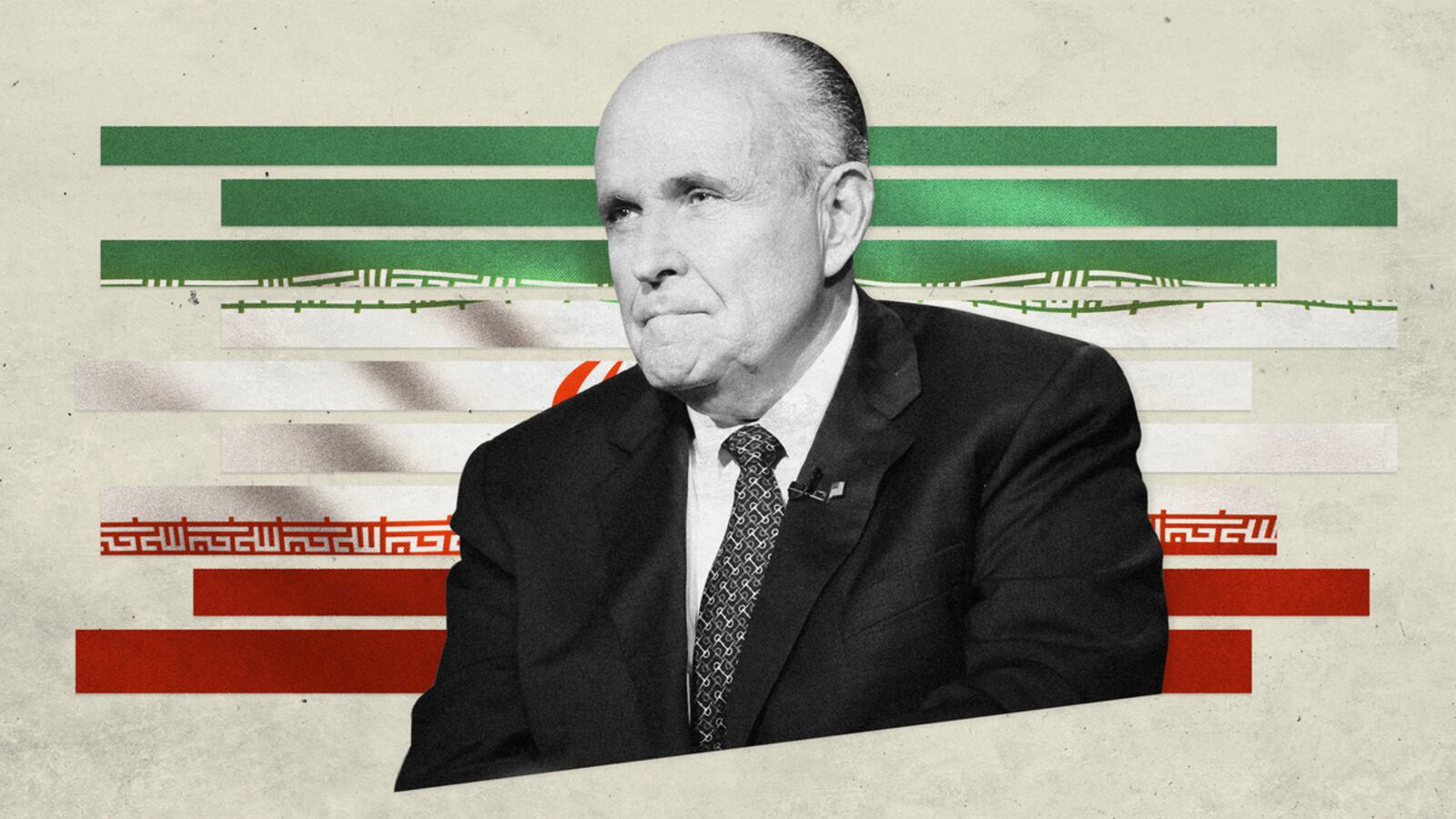As President Trump grappled with how to respond to Iran throughout the last year, one of the people he turned to for advice was his personal attorney and unofficial envoy, Rudy Giuliani.
The former New York City mayor has had a long-standing interest in Iranian affairs. He was once paid by organizations linked to an Iranian dissident group formally designated by the U.S. government as a terrorist organization—until Giuliani helped get the outfit off the terror list. As recently as the summer of 2018, Giuliani appeared on stage at an event for the People’s Mojahedin of Iran, known by its Farsi acronym, MEK. He’s stayed in touch with the group’s U.S. lobbyists, meeting with representatives of its political arm as recently as last fall. And when Trump authorized the strike that killed Qassem Soleimani, Iran’s top general, Giuliani jubilantly referred to the MEK in the first person. Soleimani was “directly responsible for killing some of my MEK people,” he told The Daily Beast in an interview on Monday afternoon. “We don't like him very much.”
And Giuliani isn’t the only MEK ally in Trump’s ear. Former Attorney General Michael Mukasey, Giuliani’s longtime friend and former law partner, is now a pro bono lobbyist for the group’s political arm, the National Council of Resistance of Iran. Trump’s recently departed national security adviser, John Bolton, is a longtime MEK ally. Former House Speaker Newt Gingrich has met with the NCRI’s Washington operation. And retired Gen. Jack Keane, a Fox News fixture, has plugged the MEK as a viable Iranian opposition.
Giuliani has parlayed his position as Trump’s lawyer and confidant into a role as a shadow diplomat, helping to steer U.S. policy in major areas of international affairs. And while Giuliani’s role in the still-unfolding Ukraine scandal contributed to the president’s impeachment last month, his behind-the-scenes advice on Iran, where Giuliani has long promoted the interests of a controversial dissident group frequently described as “cult-like,” has the potential to even further impact U.S. policy at the highest levels.
According to two sources, including one senior administration official and a source with direct knowledge, Trump has sought his personal attorney’s advice on U.S.-Iran-related matters on multiple occasions. Shortly after Trump greenlit and then called off military strikes on Iran in June that were expected to kill dozens of Iranians, for example, the president asked Giuliani if he thought he did the right thing, one of the sources said.
Giuliani’s longstanding MEK ties are the sorts of red flags that would stick out on the publicly disclosed finances of any high-level government official. Those ties were emphasized in an internal opposition research file compiled by the Trump transition team as it weighed whether to tap Giuliani to be the secretary of state. He was passed up for the post, and now, in his role as an informal but potent adviser to the president, Giuliani is helping to shape U.S. policy unencumbered by ethics rules that govern senior U.S. government officials.
“Giuliani has not filed financial disclosure reports as a government employee, nor has he filed disclosure reports as a foreign agent or lobbyist,” noted Brendan Fischer, the director of federal reforms for the Campaign Legal Center, “so the public has no idea who is paying Giuliani or how he is advancing their interests.”
The public would not know if, say, Giuliani continued to receive payments from MEK front groups, as he did in 2011 and 2012 in exchange for a handful of speaking appearances. Those payments came as Giuliani pressed for the MEK’s removal from the U.S. government’s list of designated foreign terrorist organizations. The State Department delisted the group in 2012, though the Iraqi and Iranian governments still consider it a terrorist outfit.
Asked whether he had any ongoing financial relationship with Iranian interests such as the MEK or the NCRI, Giuliani told The Daily Beast, “I have [the] same relationship everyone else has and it’s not with MEK.” He did not elaborate on Tuesday.
The NCRI did not respond to inquiries about its political and public relations strategy, and relationships with key Trumpworld figures such as Giuliani.
Giuliani declined to go into any details about specific conversations with Trump regarding the Islamic republic—and said he and the president “rarely talk about Iran” nowadays. The discussions they have had go back to the 2016 presidential campaign, he said. “I advised him on foreign policy," Giuliani said of those campaign-era discussions, but said he didn't want to get into detail about what, exactly, he's told Trump about U.S. foreign policy since the inauguration. Giuliani said he tells President Trump "what I believe” on “things he asks about, but it's not for me to say [what]… He has a very good view on Iran.”
The MEK has been targeted, often brutally so, by Iranian law enforcement and security services, including in operations in the U.S. itself. In August 2018, the FBI arrested two Iranians—Ahmadreza Mohammadi-Doostdar and Majid Ghorbani, both of whom pleaded guilty—and accused them of doing surveillance to put together target packages for Iranian intelligence. The targets included MEK members.
As part of that target surveillance, Ghorbani went to the May 6, 2018 MEK conference at the Grand Hyatt in Washington, D.C., where Rudy Giuliani spoke. Ghorbani is visible in a video of the event uploaded by the MEK standing near Giuliani as he gave a speech.
In late June of 2018, just a month before the indictment of Ghorbani and Doostdar, German police arrested an Iranian diplomat and Belgian police arrested a Belgian-Iranian couple and charged them with plotting to bomb an MEK rally in Paris where Giuliani later spoke. European intelligence agencies reportedly intercepted conversations between the Iranian diplomat, Asadollah Asadi, and authorities in Iran coordinating the plot.
There’s no indication that Giuliani plugged the MEK specifically in his discussions with the president, or that he’s promoted specific military or foreign policy proposals. But Giuliani acknowledges that his beliefs fall on the aggressive end of the policy spectrum when it comes to Iran policy.
“I'm one of those people who's convinced there has to be regime change in Iran,” Giuliani said. He called Iranian supreme leader Ayatollah Ali Khamenei an “irrational actor” and Soleimani‘s “destruction” a “good thing.”
That view on Iran puts him squarely in line with Tehran’s most vehement critics, including the MEK, which hailed the killing of Soleimani last week as a major victory and a step towards the removal of the Iranian regime. Indeed, Giuliani literally led a chant of “regime change” at an MEK event in 2018.
More recently, in September 2019, Giuliani met twice with NRCI’s registered U.S. lobbyists. He didn’t say what they discussed. But a day after the second meeting, Mukasey officially registered to lobby for the NCRI as well. Mukasey told the Justice Department that he would “communicate with executive branch and legislative officials” on a pro bono basis. He told The Daily Beast in an email that he has not discussed Iran with Trump in either his personal or professional capacity.
The NCRI’s in-house lobbyists, meanwhile, have disclosed meetings with Trumpworld figures such as former House Speaker Newt Gingrich, who still speaks often with the president and his team on various issues. The MEK’s high-profile supporters have also included Alan Dershowitz, who has become one of Trump’s foremost defenders amid the various investigations targeting the president and his administration. Dershowitz told The Daily Beast last year that he’s also advised Trump and other top administration officials on approaches to Middle East peace.
The MEK has also enjoyed support of late from retired Army Gen. Jack Keane, a Fox News “senior strategic analyst” who directly advises the president on foreign policy. Since Soleimani’s death, Keane has become a prominent booster of Trump’s decision, a move that two prior U.S. administration, as well as the Israeli government, had declined to take.
“This death of Soleimani has shook this regime that way nothing has in 41 years,” Keane said on Fox on Monday. “Khamenei himself, I believe, is personally shook by it, stunned and surprised that it actually happened.”
The MEK itself appears to have embraced a public relations strategy that targets conservative media outlets, including the television networks where its messaging has a not-insignificant chance of catching Trump’s eye directly. The NCRI’s most recent foreign agent filing, covering the six months ending on November 30, reported placing quotes and interviews with Fox News and Fox Business Network, two of the president’s favorite cable channels, and with One America News, an upstart conservative network vying to compete with Fox—and succeeding, of late, in getting the president’s attention.
It’s not clear that more forceful U.S. action against Iran will vindicate the MEK’s sustained campaign in the U.S. and abroad to establish itself as a viable alternative to the ruling Iran regime. Despite that campaign, and the roster of influential Trumpworld figures lending their support to that effort, Secretary of State Mike Pompeo ordered U.S. diplomats on Tuesday not to meet with Iranian dissident and opposition groups without explicit sign-off from Foggy Bottom. The cable explicitly mentioned the MEK, Bloomberg News reported.
But the MEK nonetheless hopes that Soleimani’s liquidation is a step towards the eventual removal of Iran’s ruling government. For Trumpworld foreign policy hawks such as Bolton, that would naturally lead to the MEK’s ascendance in Tehran.
“There is a viable opposition to the rule of the ayatollahs,” Bolton declared at an MEK event in Paris in 2017. “And that opposition is centered in this room today.”
—with additional reporting by Adam Rawnsley







